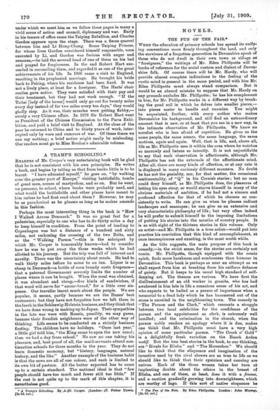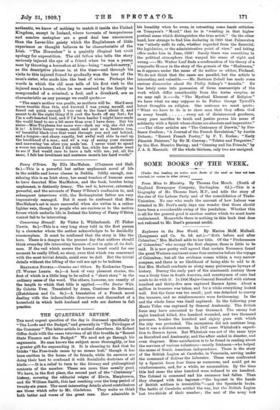NOVELS.
THE FUN OF THE FAIR.* WREN the education of primary schools has spread its unify. ing conventions more firmly throughout the land, and only the survivors of a forgotten generation in Devonshire speak of those who do not dwell in their own town or village aft "foreigners," the writings of Mr. Eden Phillpotts will be books of reference for the social custom and dialect of Devon; shire folk. Of course there will be Mr. Hardy, who will provide almost complete indications to the feeling of the rustic mind in general in the same period, and with him Mr: Eden Phillpotts must always stand comparison. But it
would be an absurd mistake to suppose that Mr. Hardy on any grounds excludes Mr. Phillpotts ; he has his complement in him, for Mr. Phillpotts works in a different way by break- ing the good soil in which he delves into smaller pieces,— into pieces easier to handle and examine. You' might be acquainted, further, with every author who makes Devonshire his background, and still find an extraordinary amount that is new, or at least that you see in a new way, in the intimate observation of Mr. Phillpotts. We know no novelist who is less afraid of repetition. He gives us the same people, the same scenes. the same language, the same motives, again and again. Well, that is life, and, above all; life as Mr. Phillpotts sees it within the area where he watches so narrowly and listens so intently. It is not unjustifiable to say that such observation is affectionate, although Mr.. Phillpotts has not the externals of the affectionate mind. After all, there are many kinds of affection, or at any rate it is displayed in many curiously different manners. No doubt he has not the geniality, nor, for that matter, the occasional sentimentality, of " Q" in his Cornish stories ; but no man could deny himself, as Mr. Phillpotts does, the pleasures of letting his eyes stray, or would starve himself in many of the obvious materials of ambition, if he had not a sincere and profound affection for that of which he chooses so con- sistently to write. He can give us when be pleases radiant landscapes and seascapes ; he can give us an extensive and very characteristic philosophy of life ; but very often indeed he will prefer to submit himself to the imposing limitations of putting his stories into the mouths of country people. It is so with eight of the thirteen stories in this volume. Only an artist—and Mr. Phillpotts is a true artist—would put into practice his conviction that this kind of accomplishment, at once inconspicuous and exacting, is the most worth while.
As the title suggests, the main purpose of this book is comedy,—in the strict sense, for the stories are certainly not comic. Mr. Phillpotts, though equipped with the comic spirit, finds more harshness and sombreness than humour in Devonshire. This book is perhaps as near an attempt as we shall expect from him at breaking from his uniform defiance of gaiety. But it keeps to his usual high standard of self- denying art. The themes are various. We have first the disillusionment of an old worker in granite, who has had awakened in him late in life a conscious sense of his art, and who expects to be hailed as a person of importance when a memorial to a dead lady which be has hammered out of the stone is unveiled in the neighbouring town. The comedy in " The Parson and the Clerk," which recounts a struggle between two local celebrities for the confidence of the parson and the appointment as clerk, is extremely well handled; and the culmination in the church, when the parson nobly renders an apology where it is due, makes one think that Mr. Phillpotts must have a very high opinion of some particular parson. "The Crock o' Gold" is a delightfully fresh variation on the Enoch Arden motif. But the two best stories in the book, to our thinking, are "Rivals for Elisha" and "The Horseshoe." We should like to think that the elOquence and imagination of the
invective used by the rival shrews are as true to life as we should like to think that their cynicism and cunning are untrue. Each of the three women takes her turn at implanting doubts about the others in the breast of Elisha, and one of them, at least, does it with a finesse, and a caution gradually growing into downrightness, which are worthy of Iago. If this sort of native eloquence be • The Fun of the Fair. By Eden Phillpotts, London : John Murray. [2s. ed. net.]
authentic, we know of nothing to match it inside the 'United Kingdom, except in Ireland, where torrents of tempestuous and sombre metaphor are a good deal less uncommon than the Lever-like gaiety which the Englishman of little experience or thought believes to be characteristic of the Irish. "The Horseshoe" is a quaintly illogical but vivid apology for superstition. The old fellow who tells the story seriously injured the eye of a friend when he was a young man by throwing a horseshoe at him—being " market-merry," as the descriptive phrase is, at the time—and through his visits to this injured friend he gradually won the love of the man's sister, who made him .the best of wives. Perhaps the words in which the old man tells of his first visit to the injured man's house, when he was received by the family as compounded of a criminal, a fool, and a drunkard, are as characteristic as any passage we could quote :—
" The man's mother was gentle, as mothers will be. She'd seen worse trouble than this, and knowed I was young myself, and found out quick, enough I was cut to the heart about it, and meant to do the right thing if it cost the boots off my feet ; for I'm a soft-hearted toad, and if I'd been harder I might have made the world bend to me a bit more than ever I have done. But his sister—Miss Tryphena her name was—dash my wig, she did rub it in ! A little bungy woman, small and neat as a bantam hen, wi' beautiful black eyes that went through you and out behind, and a tongue—not sharp exactly, but awful well able to curl up the hardihood of a man ; and wi' a way of seeing your excuses and answering 'em afore you made 'em. I never want to spend a worse ten minutes than I did with her, while her mother went to see if Ned would care to have a talk with me ; yet, all the same, I felt her loveliness and neatness more'n her hard• words."







































 Previous page
Previous page